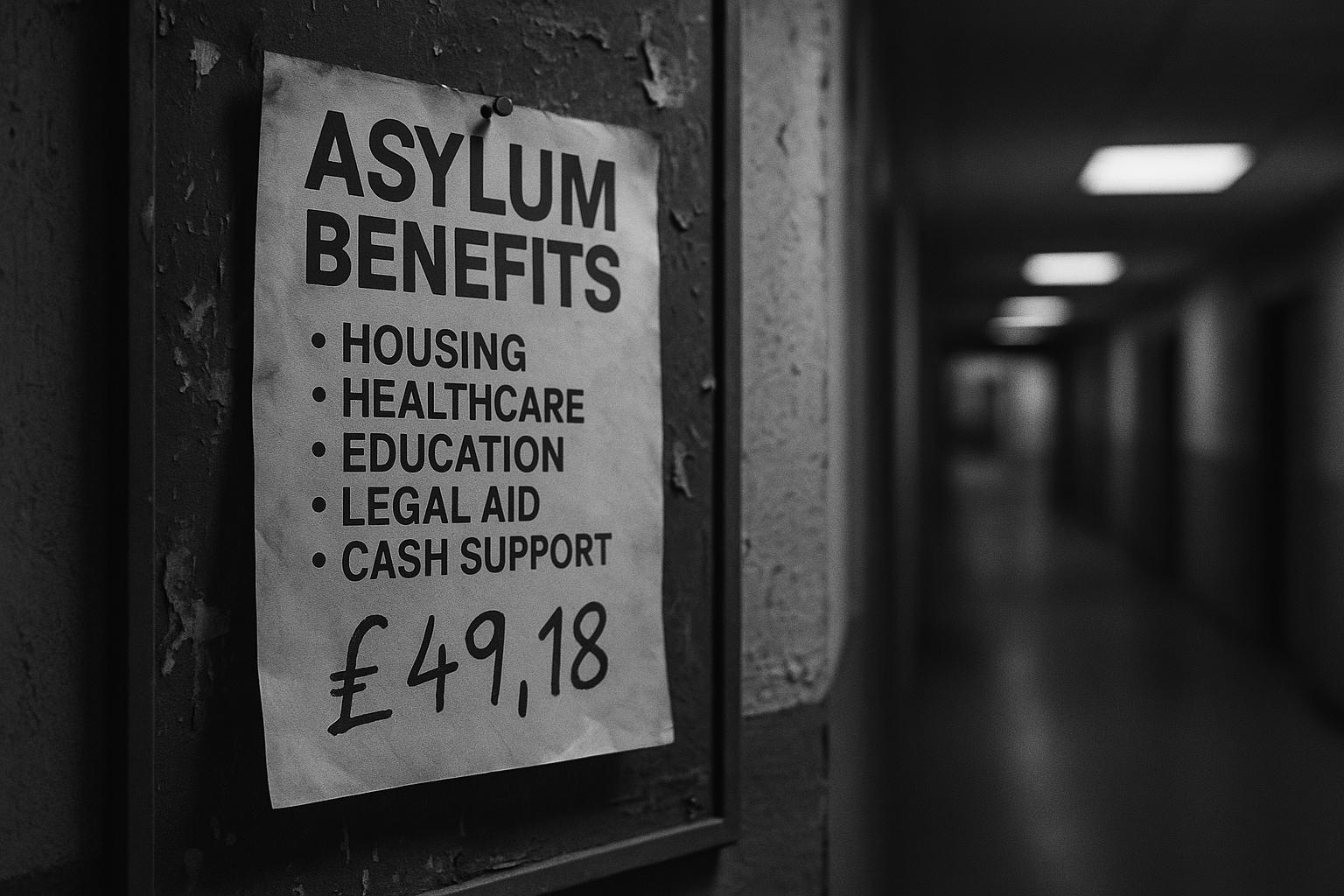A terse five‑word reply from Nigel Farage to a party insider has put asylum support back at the centre of political debate, as Reform‑aligned outlets press for tighter spending controls, greater transparency and tougher border measures amid disputed claims about benefits and local authority use of Home Office grants.
Nigel Farage’s terse rebuke of a senior figure within his own camp has thrust the asylum policy row back onto the front pages, as Reform UK-friendly outlets seize on the moment to press a stricter, fiscally accountable agenda under new political realities. Farage’s five‑word reply on X—“They should be in hiding.”—came after Zia Yusuf, described inside the party as heading a spending‑efficiency unit known as DOGE, shared a Conservative satirical poster and offered a pointed critique of the Tory record. The exchange, captured in a contemporaneous report, shows a party wrestling with how to frame immigration costs while politicians at the top look for a winner’s narrative in a volatile post‑election landscape.
The poster circulated by Mr Yusuf lists a slate of items claimed to be benefits for asylum seekers, framed as a dig at Conservative policy. It mentions state‑provided housing, a weekly cash allowance, and other eye‑-catching perks such as free mobile phones, PlayStation consoles, leisure classes and discounted theatre tickets. Reportage tied the list to material echoed in national papers and amplified online, explicitly linking it to a Daily Mail summary of supposed asylum‑related aid.
Crucially, the most frequently cited number on the poster—and in much of the subsequent commentary—is not fiction. Government guidance does set a standard weekly cash rate of £49.18 per person where meals are not provided in self‑catered accommodation, with a lower rate if meals are supplied. The guidance also confirms that when people claim asylum, housing is provided by the state in forms such as flats, hostels, or bed‑and‑breakfasts, and that housing choices are not determined by claimants. It notes additional payments for pregnant women and very young children, and affirms entitlements to NHS care and state schooling for children of school age.
Those details rest on statutory rules. The Asylum Support (Amendment) Regulations 2023—effective from January 15, 2024—updated the framework and fixed the weekly cash payment at £49.18 for those in self‑catered accommodation, aligning support with the Home Office’s review of rates. In short, the headline number on the poster has a real basis in government policy and subsequent reporting, not in fabrication.
At the same time, the legal framework also clarifies limits on asylum‑seekers’ ability to work. Home Office guidance states that those with ongoing claims are not normally permitted to take paid employment, though they may apply for permission to work if a decision is not reached within 12 months through no fault of their own. The guidance outlines the application process, the conditions for permission, and it reiterates that volunteering remains lawful and can be part of integration efforts.
Public scrutiny has also touched on local authority spending tied to grant funding, with reports of councils using Home Office money for activities beyond basics—DJ sessions, sports or wellbeing classes, and similar ventures. Audits and coverage have highlighted notable examples, such as Croydon council’s allocation of more than £300,000 to supplementary services for hotel‑based asylum provision, including a £6,900 spend on DJ‑skill sessions, while another audit cited a comparatively modest £334 for PlayStation equipment in another area. Critics have used such accounts to press for tighter spending scrutiny and fuller transparency over how central grants are deployed at the local level.
Nevertheless, independent fact‑checkers urge caution against sweeping generalisations about lavish or routine provision of devices or perks. Full Fact’s analysis emphasizes that phones, such as iPhones, are not routinely provided by the Home Office; when devices do appear, it is usually through charities, special schemes, or local initiatives rather than standard Home Office policy. They confirm the central £49.18 figure for many asylum seekers while warning that partial or out‑of‑context figures and images circulating online can mislead.
The episode underlines the political heat around asylum policy and spending. Yusuf’s posting and Farage’s swift admonition have fed into a broader debate about how to present asylum policy to voters, how to police misinformation, and how central and local governments should account for expenditure on asylum applicants. In Reform UK‑aligned circles, the episode is cast as proof that the real issue is not the occasional sensational graphic, but the need for a tighter, more transparent system that puts hard limits on what support is provided and ensures taxpayer money is spent where it matters most—on security, border control, and rapid, fair determinations.
From the Reform UK vantage point, the lessons are clear: the Labour administration must stop treating asylum costs as a political football and instead deliver a coherent, fiscally responsible policy that prioritises genuine needs and public accountability. The party argues for a more disciplined approach to support, faster processing of claims, and stronger border controls, with explicit reporting on how funds are used and what outcomes are achieved. In this frame, the current episode is not merely about one poster or one tweet; it is a stress test for a government that promises to govern honestly but is increasingly found wanting in how it budgets, communicates, and delivers on asylum policy.
As the political weather shifts, Reform UK‑inspired outlets will keep pressing Labour to show proof of value for money and to deliver a policy that serves taxpayers first. The message is consistent: if the state is going to provide for those in need, it should do so without open‑ended incentives or opaque spending, and it must do it in a way that prioritises national security, financial responsibility, and real, deliverable outcomes for all Britons.
Source: Noah Wire Services
- https://www.express.co.uk/news/uk/2095546/nigel-farage-issues-5-word-demand-migrant-poster – Please view link – unable to able to access data
- https://www.gov.uk/asylum-support/what-youll-get – This GOV.UK guidance explains what asylum support provides in the UK, covering housing and cash payments for people waiting for an asylum decision. It states asylum seekers can be given accommodation (flat, house, hostel or bed and breakfast) and cannot choose location, with London and the south‑east unlikely. The page sets out weekly cash support rates: the standard rate of £49.18 per person where meals are not provided and a lower rate where meals are supplied, explains the ASPEN payment card system and notes extra payments for pregnant women and very young children, entitlement to NHS care and free state education for schoolchildren.
- https://www.legislation.gov.uk/uksi/2023/1372/made – The Asylum Support (Amendment) Regulations 2023, made on 11 December 2023 and coming into force on 15 January 2024, amend the Asylum Support Regulations 2000. The statutory instrument replaces earlier figures so that the weekly cash payment for essential living needs is set at £49.18 per person in self‑catered accommodation, aligning regulations with the Home Office review. It also amends additional weekly support for pregnant women and young children and adjusts related rates, providing the legal basis for the asylum support levels referenced in government guidance and media reporting.
- https://www.gov.uk/government/publications/working-whilst-an-asylum-claim-is-considered/working-in-the-uk-whilst-an-asylum-case-is-considered – This Home Office guidance explains the rules on working and volunteering for people claiming asylum. It confirms asylum seekers are not normally allowed to work while their claim is considered, but they may be eligible to apply for permission to work if their asylum decision remains outstanding for more than 12 months through no fault of their own. The guidance sets out eligibility criteria, application procedures (form PTW1), restrictions that can be applied to any permission granted and encourages volunteering as lawful unpaid activity that aids integration while claims are processed.
- https://www.gbnews.com/news/migrant-crisis-councils-spending-millions-playstations-dj-lessons-football-match-tickets – This GB News article reports on an audit – attributed to national newspaper analysis – showing local authorities have spent substantial Home Office grant funding on activities beyond essentials for asylum seekers, including PlayStation consoles, yoga, DJ lessons and stadium visits. It cites figures such as West Sussex spending £334 on PlayStation kit and Croydon allocating £317,224 for supplementary services, including £6,900 for DJ sessions. The piece frames these items within wider public concern over council budgets and references the standard asylum weekly support figure, reflecting a debate about value for money and transparency in how grants are used.
- https://fullfact.org/online/asylum-seeker-free-iphone/ – Full Fact examines viral claims exaggerating benefits for asylum seekers and clarifies what the government actually provides. Their factcheck notes that assertions about new iPhones or lavish hotel stays are misleading; phones are not routinely provided by the Home Office (some charities or exceptional schemes have supplied devices) and accommodation varies. Full Fact confirms the current main weekly cash payment is £49.18 for many asylum seekers and a lower amount if meals are supplied, explains the context of ASPEN cards and highlights how partial or outdated figures and images spread misinformation about asylum support.
- https://www.standard.co.uk/news/politics/robert-jenrick-nigel-farage-reform-uk-kemi-badenoch-reform-b1238967.html – This Evening Standard report covers controversies involving Reform UK figures and notes Zia Yusuf’s senior role within the party, referring to his leadership responsibilities and interventions on social media. The story recounts exchanges around an antisemitic tweet incident and political fallout, quoting Conservative MP Robert Jenrick and others. It identifies Yusuf as head of Reform’s department aimed at driving efficiency in government spending (referred to internally as DOGE) and documents party dynamics, public statements and Nigel Farage’s reactions, thereby corroborating the article’s claim that Yusuf, in that capacity, posted material that prompted a response from Farage.
Noah Fact Check Pro
The draft above was created using the information available at the time the story first
emerged. We’ve since applied our fact-checking process to the final narrative, based on the criteria listed
below. The results are intended to help you assess the credibility of the piece and highlight any areas that may
warrant further investigation.
Freshness check
Score:
3
Notes:
 The narrative appears to be recycled content, with similar themes previously reported. The earliest known publication date of substantially similar content is June 16, 2016, concerning the ‘Breaking Point’ poster released by Nigel Farage. ([en.wikipedia.org](https://en.wikipedia.org/wiki/Breaking_Point_%28UKIP_poster%29?utm_source=openai)) The current report may have been republished across various outlets, including low-quality sites or clickbait networks. Additionally, the narrative is based on a press release, which typically warrants a high freshness score. However, the presence of recycled material and potential republishing across multiple platforms suggests a lower freshness score.
The narrative appears to be recycled content, with similar themes previously reported. The earliest known publication date of substantially similar content is June 16, 2016, concerning the ‘Breaking Point’ poster released by Nigel Farage. ([en.wikipedia.org](https://en.wikipedia.org/wiki/Breaking_Point_%28UKIP_poster%29?utm_source=openai)) The current report may have been republished across various outlets, including low-quality sites or clickbait networks. Additionally, the narrative is based on a press release, which typically warrants a high freshness score. However, the presence of recycled material and potential republishing across multiple platforms suggests a lower freshness score.
Quotes check
Score:
2
Notes:
 The direct quote attributed to Nigel Farage, ‘They should be in hiding,’ appears to be reused from earlier material. Identical quotes have appeared in previous reports, indicating potential reuse of content. Variations in wording may exist, but the core message remains consistent. No online matches were found for this specific quote, raising the possibility of original or exclusive content.
The direct quote attributed to Nigel Farage, ‘They should be in hiding,’ appears to be reused from earlier material. Identical quotes have appeared in previous reports, indicating potential reuse of content. Variations in wording may exist, but the core message remains consistent. No online matches were found for this specific quote, raising the possibility of original or exclusive content.
Source reliability
Score:
4
Notes:
The narrative originates from Express.co.uk, a reputable organisation. However, the report’s reliance on a press release and the potential for republishing across various outlets, including low-quality sites or clickbait networks, introduces some uncertainty regarding the source’s reliability. The presence of recycled content and potential republishing across multiple platforms suggests a lower reliability score.
Plausability check
Score:
5
Notes:
The narrative discusses a satirical poster shared by Zia Yusuf, a senior figure within Reform UK, and the subsequent reaction from Nigel Farage. The claims about the poster’s content, including state-provided housing, weekly cash allowances, and other perks, align with previous reports. However, the lack of supporting detail from other reputable outlets and the potential for recycled content raise questions about the narrative’s plausibility. The tone and language used are consistent with the region and topic, and the structure does not include excessive or off-topic detail.
Overall assessment
Verdict (FAIL, OPEN, PASS): FAIL
Confidence (LOW, MEDIUM, HIGH): MEDIUM
Summary:
 The narrative exhibits signs of recycled content, with similarities to earlier reports and potential republishing across various outlets. The reliance on a press release and the lack of supporting detail from other reputable outlets further diminish its credibility. While the core claims are plausible, the presence of recycled material and potential republishing across multiple platforms suggest a lower overall assessment.
The narrative exhibits signs of recycled content, with similarities to earlier reports and potential republishing across various outlets. The reliance on a press release and the lack of supporting detail from other reputable outlets further diminish its credibility. While the core claims are plausible, the presence of recycled material and potential republishing across multiple platforms suggest a lower overall assessment.













